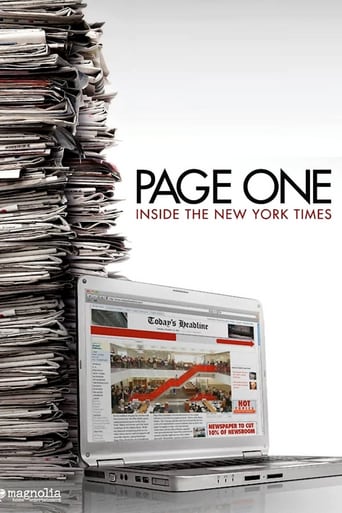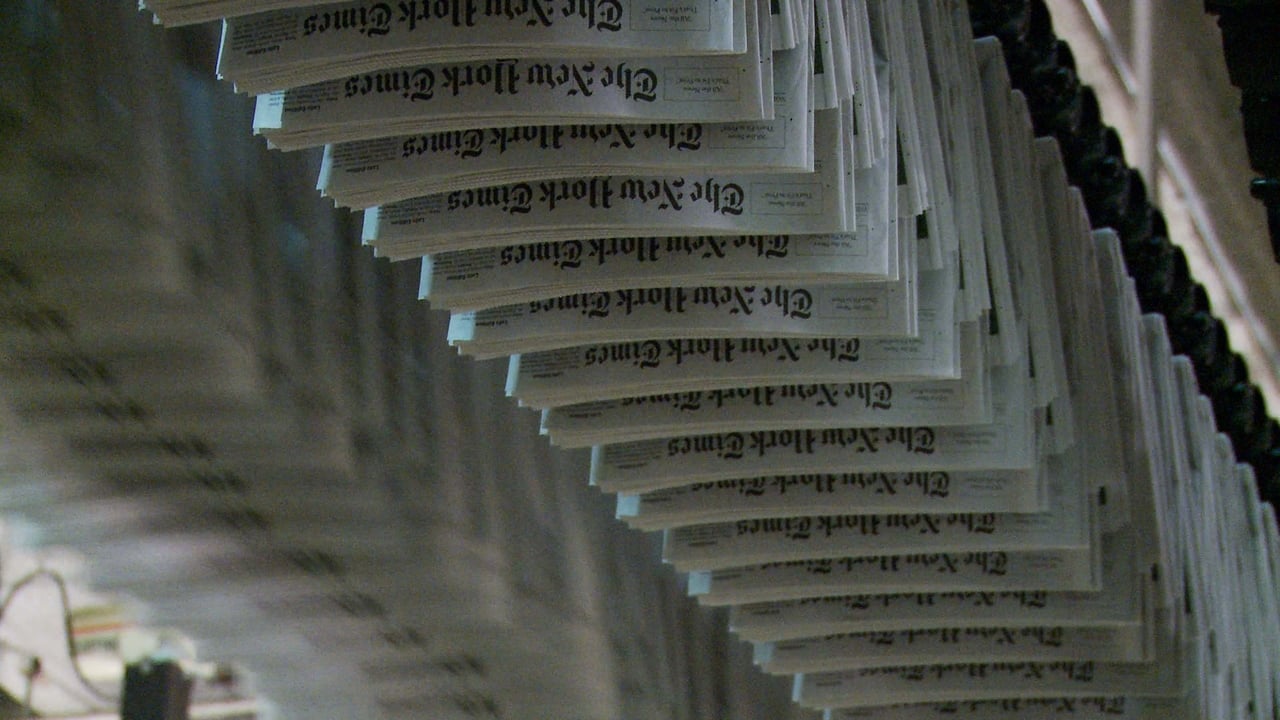Sam Boutelle
Intimidating as it inspires, Page One pushes cameras into one of the highest-pressure environments around and captures a few human moments in the midst of empire-cleaving times. As he explores the prognosis for the Gray Lady, Andrew Rossi also lends light to lives led in pursuit of larger issues, and he illuminates just how frantic days are within the halls and heads of those responsible for the paper of record. Best of all, we're allowed to be entertained by journalists who otherwise appear only in text that has been scraped and stapled by an institution until its fit to print. More than the documentary's macro plunge into the fate of print media, it is these nicks and knacks of picking up Twitter and trying to break through to clarity in reporting that defines Page One as an inside scoop.
Likes_Ninjas90
There's not a lot in Page One: A Year Inside The New York Times that you didn't already know. For anyone with the faintest interest in digital media you'd be aware of the ongoing conflict between newspapers and Internet culture. In the eyes of many people online blogs and social networking sites, such as Facebook and Twitter, are reducing the relevancy of print media. It raises questions of accessibility and punctuality: why should people still purchase a newspaper anymore when they can freely obtain the same information online and in many cases earlier too? The argument is topical and presented here with balance and cohesiveness. But the documentaries few revelations and limited scope ensures that most viewers should not pay full price to see this at the cinema. As with Cave of Forgotten Dreams (2011) this is a documentary you could happily watch at home on television, without losing its impact. And there is certainly some intriguing material that makes it worth watching in one medium or another. Drawing from recent headlines smartly prevents the documentary from becoming a history lesson and provides a contemporary relevance. One of the more damaging recollections is that over one hundred workers had to be sacked from the Times because of the falling revenue. There are also interesting snippets discussing the shame that journalists like Judith Miller brought to the Times when she falsely reported on the War in Iraq and was then sacked. It's shown as a huge blight on the reputation of the paper that has been sustained for decades. How profoundly reputable the Times has been is something I wasn't aware of till now. We are told that all of the major news stories would have once been drawn firstly from the Times. Equally notable is the more favourable light that the documentary casts on WikiLeaks and its founder Julian Assange. Reporters working in the Times regard his site as another source of information that they can use. Referencing WikiLeaks is also an intelligent example of the way that digital media has threatened to upstage print journalism for the big headlines. It's pleasing that there's real balance given to digital media here too. Although WikiLeaks is regarded as a legitimate tool, there's a moment where the Times reporters debate whether to write on a released Youtube video showing US soldiers opening fire on a group. They discover that the video was cut significantly, removing footage of an insurgent aiming an RPG weapon. This rightly hints at the way that information can be cunningly manipulated and reworked by various forms of media. And personally I believe that unedited and opinionated blogs are more likely to fall into the trap of rumour and misinformation because they are frequently written with a specific agenda. More amusing is when the Times learn that NBC is hosting a parade overseas for the soldiers that neither the White House nor the Pentagon knows anything about it. We briefly see the panic between the editors, fearing that they might wake up the next day and discover that it was a real story and they're the only ones who didn't run with it. That's an insightful moment, showing how important it is for print media to keep in touch. I also enjoyed the company of reporter David Carr. This bloke is a real character. A recovering crack addict and now a single parent, Carr is a passionate defender of the paper and rather hilariously shuts down anyone who tries to talk about its demise. There's a very funny scene where we're introduced to a twenty-one year old blogger who was hired by the Times. David says that he is convinced that the kid was a robot built in the basement of the Times to destroy him. He also makes an excellent point when someone tries to emphasis the punctuality of blogs over newspapers. He reminds everyone that the Times itself has over eighty of its own blogs, as well as hundreds of videos posted and asks why people would go to Facebook for information instead. His sarcasm brings a lot of personality to this documentary and I enjoyed the scenes with him the most. Disappointingly, the documentary misses a great chance to talk about physical technology in the form of tablets, like the Apple iPad. I was pleased and excited to see the documentary show the device but it doesn't elaborate on what can be done with it. A tablet can provide readers with not only continuously updated information but also unlimited writing space too. As someone who is aware of film criticism, for example, being reduced to decreasing bites in print media, that's a pretty significant point to understate. Overall, despite the small pockets of information, the delicacy to balance the film and the colourful presence of David Carr, I could still only recommend this as a late night television viewing, rather than a full price theatrical release.
Jackpollins
Page One is a documentary that follows the newspaper business, a business that is being beat out by the internet and mobile devices. The film follows one year at The New York Times and the people who work there. The main focus of the film is David Carr, a journalist with a rough exterior but a good heart and a great wit. Carr is a former drug addict and a New York Times reporter for many, many years. Carr has been writing for so long that he even says during the film "If you write about media long enough, eventually you type your way to your own doorstep." Carr is a fascinating character. This summer, we have gotten Thor, Captain America, The Green Lantern, Mr. Popper, ETC, but nothing beats watching a real guy with real strengths and genuine flaws go through every day life. Carr is an incredibly smart and humorous man with quick responses to just about everything. There is a scene, for example, when David Carr is looking at an I Pad with a fellow employee. Carr says "Wow, this is a great reading experience," in which he follows up with "you know what this reminds me of?..a newspaper." There are a lot of funny lines like that from Carr throughout the film. While there are a lot of people we get to meet and share experiences with in Page One, Carr is the only one worth reviewing because he is the only one who brings a realism to his role as a reporter. I must add that seeing how all of these people live is fascinating, but Carr is truly the only one who makes Page One worth reading into.
FilmRap
The news media has been undergoing a radical change in the last few years. The new media and the blogosphere is rapidly competing as a source of breaking news. Advertising revenue has fallen as much as 30 % in the past year for many of the leading newspapers. Many newspapers throughout the country have closed. It is rare to have two major newspapers even in a large city, let alone three of them. Filmmaker Andrew Rossi persuaded the venerable New York Times to let him spend close to a year to be essentially embedded, mostly in their New York headquarters, in order to make a documentary showing how they are carrying on their proud tradition in the face of all these changes. While he worked closely with his wife filmmaker Kate Novack, and a team of editors, it was Rossi alone who roamed the multi-leveled headquarters with his trusty camera on his shoulder. He was there when the WikiLeaks story broke and he was able to capture how the New York Times writers and editorial staff struggled with the ethics and ultimate decision to print the leaks and how they became part of the story. He was filming at the staff meetings when the writers and editors were trying to figure out if the war in Iraq was coming to an end because NBC was breaking a story about departing troops but it wasn't part of the US government announcements. The central character in the much of this documentary is NY Times writer David Carr who himself has a very colorful history, once being addicted to cocaine and now being a senior well respected, witty, crusty, very capable reporter who mostly covers media issues. The film shows us how he approached the big time story of the collapse of the well known Tribune media giant, its subsequent buyout by some non newspaper people who bled the organization, dismantled their ethical base and were running a corrupt unethical management team themselves. They ultimately resigned demonstrating the power and value of the New York Times, functioning at its best as it used all its resources to report this story. In the end we are quite enlightened about the changes in how we get our news and the choices we have. We are also quite impressed as we see the coming together in a working alliance of young new media people within the powerful "legacy" news organizations symbolized by the New York Times. Working side by side or cubicle to cubicle this new generation of Times men and women seem to be able to provide the leadership and a viable co-existence with the huge blogosphere that continues to grow. It is clear that everything will be different with each year or two and the concluding lines of the story have not yet been written, This documentary does capture this fascinating piece of evolving journalism in a verite style. It is somewhat choppy without a clear plot, which reflects the nature of the content. You may walk away from this film and say , "I sort of knew all this" but for certain you will not take David Carr and his colleagues for granted any more. (2011)FilmRap.net


 AD
AD

